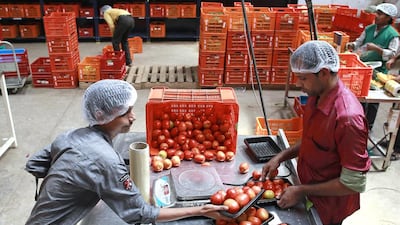Shyamlal Shrivastav, a tomato seller in the northern suburbs of Mumbai, was surprised to discover a couple of weeks ago that 30 crates, or 900kg of tomatoes had been stolen from him.
Tomatoes have surged to well over 100 rupees a kilogram, or more than five times their normal prices in India in recent weeks, making them highly attractive to thieves.
“I went home and came back and all the tomatoes were gone,” says Mr Shrivastav. “I was shocked and reported it to the police.”
Traders blame rains, which have damaged crops and prompted a shortage in tomatoes for the price surge.
Despite the spike in tomato prices, analysts say the impact on inflation in India is likely to be limited at the moment, although onion prices have also risen higher in parts of the county in the past few days.
Satish Modh, the director of the VES Institute of Management Studies and Research in Mumbai, says tomatoes make up a small percentage of the basket of goods used to measure inflation.
But the prices of staple goods such as tomatoes do have a huge impact on the poor, with the fruit being a vital part of many Indian dishes. And in the past, the price of the humble onion has been proven to have the ability to topple governments.
“If people below the poverty line are not able to buy their daily food, it is going to have some impression in their mind that this government is not taking care of us,” says Mr Modh.
In 1998, the ruling party in India was routed because of a surge in onion prices.
Tomatoes have become so expensive that in the state of Madhya Pradesh in central India, armed guards are being used to keep thieves away in fruit and vegetable markets.
Delhi's local government on Wednesday ordered daily inspections of wholesale markets in the capital, to check for hoarding of produce, which can sometimes be used to artificially drive up prices.
Pradip Desai, a tomato trader in a wholesale market in Navi Mumbai, says that he expects tomato prices to ease later this month, once the next batch of crops come through.
“They should start to reduce if the next crop is good,” he says.

